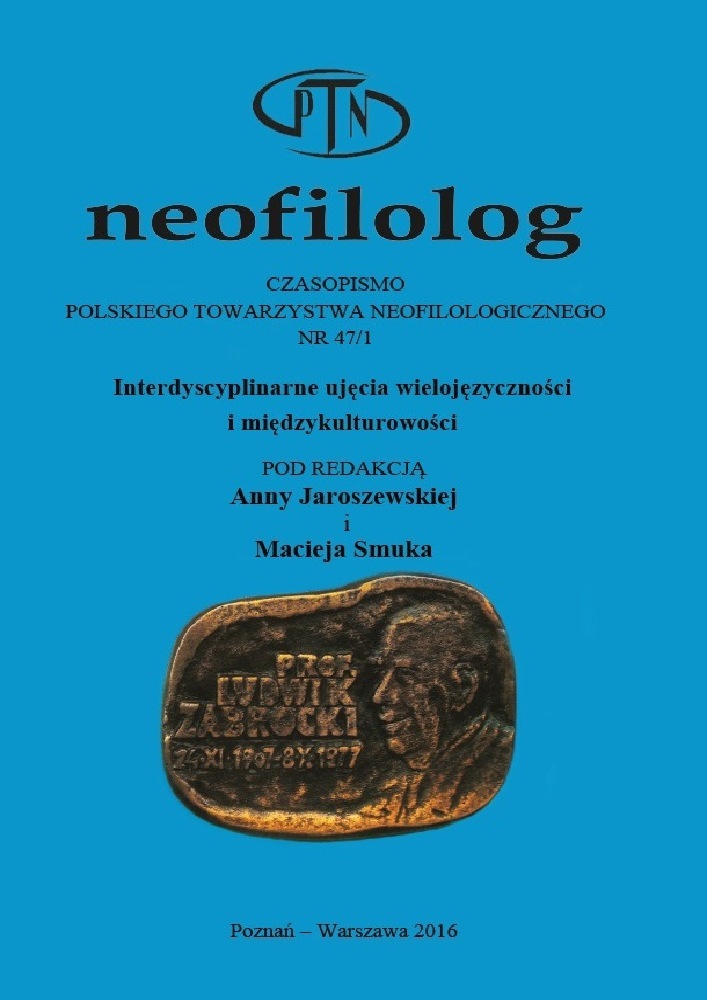Abstrakt
The present paper attempts to investigate the developement of existential competence within the framework of the intercultural approach to foreign language teaching. The main dimension of this approach to be explored is the application of the semantic analysis of key words for each culture designating values. To better understand the theoretical background of the intercultural competence its main aspects will be analyzed, i.e. alterity, representation, and identity. The analysis will especially include the process of discovering the real meaning of words
within their cultural background. Such a reflective approach to teaching and learning foreign languages allows the students to change their ethical attitude towards foreign cultures as well as their own culture.
Bibliografia
Bartmiński, J. 2003: „Miejsce wartości w językowym obrazie świata”. (w) Język w kręgu wartości. (red. J. Bartmiński). Lublin: Wydawnictwo Uniwersytetu Marii Skłodowskiej-Curie, str. 59-87.
Baumgratz-Gangl, G. 1993. Compétence transculturelle et échanges éducatifs. Paris: Hachette.
Beacco, J. C. 2000. Les dimensions culturelles des enseignements de langues. Paris: Hachette.
Byram, M. 1997. Teaching and Assessing Intercultural Communicative Competence. Clevedon: Multilingual Matters.
Byram, M., Gribkova, B. i H. Starkey. 2002. Développer la dimension interculturelle del’enseignement des langues: une introduction pratique à l’usage des enseignants. Strasbourg: Conseil de l’Europe.
Byram, M., Neuner, G., Parmenter, L., Starkey, H. i G. Zarate. 2003. Intercultural competence. Strasbourg: Council of Europe.
Chauvigné, C. 2013: „Former? Éduquer? Comment s’inscrit l’apprentissage de l’éducation à la citoyenneté dans le parcours des lycéens en France?”. (w) Peut-on encore éduquer à l’école? (red. L. Clavier). Paris: L’Harmattan, str. 91-127.
Coste, D. 1994: „Dépendant de la culture et non-dépendant de la culture”. (w) Vingt ans dans l’évolution de la didactique des langues. Paris: Crédif, Hatier-Didier, str. 117-137.
Dryjańska, A. 2013: „Kształtowanie postaw etycznych uczniów na lekcji języka obcego w szkołach katolickich wobec problematyki wartości”. (w) Dydaktyka językowa a kompetencje ogólne. (red. J. Stańczyk i E. Nowikiewicz). Bydgoszcz: Nauczycielskie Kolegium Języków Obcych, str. 197-211.
Europejski System Opisu Kształcenia Językowego: uczenie się, nauczanie, ocenianie. 2003. Warszawa: Wydawnictwa CODN.
Fasko, D., Osborne, J. i D. Abell, 2008: „Values Education and Adolescents Revisited”. (w) Contemporary Philosophical and Psychological perspectives on Moral Development and Education. (red. D. Fasko i W. Willis). New Jersey: Hampton Press, Inc., Cresskill, str. 143-167.
Forestal, Ch. 2009. „La démarche transculturelle en Didactique des Langues-Cultures: une démarche discutable… et/ou qui mérite d’être discutée”. Synergies, 6: 59-75.
John-Steiner, V. P. 2007: „Vygotsky on Thinking and Speaking”. (w) The Cambridge Companion to Vygotsky. (red. H. Daniels, M. Cole i J. V. Wertsch). London: Cambridge University Press, str. 136-155.
Lazar, I. 2008. Développer et évaluer la compétence en communication interculturelle. Strasbourg: Conseil de l’Europe.
Oudin, N. 2013: „La valeur éducative des savoirs au collèges”. (w) Peut-on encore éduquer à l’école? (red. L. Clavier). Paris: L’Harmattan, str. 53-91.
Puzynina, J. 1992. Język wartości. Warszawa: Wydawnictwo Naukowe PWN.
Seneka, L. A. 1989. Myśli. Kraków: Wydawnictwo Literackie.
Smith, H. 1976. The Russians. London: Sphere Books.
Smuk, M. 2014: „Le savoir-être de l’apprenant au service du processus d’autonomisation”. (w) Synergies Chine 9/2014. Autonomie dans l’apprentissage des langues et apprentissage de l’autonomie. (red. F. U. Rong, P. Mogentale). Beijing/Pékin: Sylvains-les-Moulins, str. 41-51.
Wierzbicka, A. 2013. Słowa klucze. Różne języki – różne kultury. Warszawa: Wydawnictwo Uniwersytetu Warszawskiego.
Wygotski, L. S. 1987: „Thinking and speech”. (w) The collected works of L. S. Vygotsky. Vol. 1. Problems of general psychology. (red. R. W. Rieber i A. S. Carton). New York: Plenum Press, str. 39-285.
Zając, J. 2010. „Glottodydaktyka w ujęciu epistemologicznym”. Neofilolog, 34: 37-48.
Zarate, G. 1993. Représentations de l’étranger et didactique des langues. Paris: Didier.
Zinchenko, V. P. 2007: „Thought and Word”. (w) The Cambridge Companion to Vygotsky. (red. H. Daniels, M. Cole i J. V. Wertsch). London: Cambridge University Press, str. 212-246.
Netografia
Bauman, Z. 2011. „Culture in a Liquid Modern World”. [on-line: http://www.amazon.fr/Culture-Liquid-Modern-Zygmunt-Bauman/dp/0745653553#reader_0745653553; DW 29.07.2014].
Hawkes, N. 2001. „Being a school of excellence: values-based education”. [on-line: http://www.livingvalues.net/reference/excellence.html; DW 5.09.2015].
Katajew, W. P. 2013. „Белеет парус одинокий”. [on-line: http://www.lib.ru/PROZA/KATAEW/parus.txt; DW 10.01.2016].
Programme d'enseignement moral et civique. [online:http://www.education.gouv.fr/pid25535/bulletin_officiel.html?cid_bo=90158; DW 7.01.2016].
Puren, Ch. 2008. „Évolution historique des configurations didactiques”. [on-line: http://www.christianpuren.com/biblioth%C3%A8que-de-travail/029; DW 10.09.2015].
Rada Europy. 2002. „Marco Europeo Común de Referencia para las Lenguas: Aprendizaje, Enseñanza, Evaluación”. [on-line: http://cvc.cervantes.es/ensenanza/biblioteca_ele/marco/cvc_mer.pdf; DW11.12.2015].
Rada Europy. 2002. „Gemeinsamer europäischer Referenzrahmen für Sprachen:Lernen, lehren, beurteilen”. [online: http://www.goethe.de/z/50/commeuro/50103.htm DW11.12.2015].
Licencja
Prawa autorskie (c) 2018 Agnieszka Dryjańska

Utwór dostępny jest na licencji Creative Commons Uznanie autorstwa – Bez utworów zależnych 4.0 Międzynarodowe.
Przedstawiany utwór (artykuł) upubliczniany jest na podstawie umowy z autorem i na licencji Creative Commons Attribution-NoDerivatives 4.0 International (CC BY-ND 4.0).
Użytkownicy mają obowiązek podania wraz z rozpowszechnionym utworem, informacji o autorstwie, tytule, źródle (odnośniki do oryginalnego utworu, DOI) oraz samej licencji;
- bez tworzenia utworów zależnych,
- utwór musi być zachowany w oryginalnej postaci.
Uniwersytet im. Adama Mickiewicza w Poznaniu zachowuje prawo do czasopisma jako całości (układ, forma graficzna, tytuł, projekt okładki, logo itp.).
